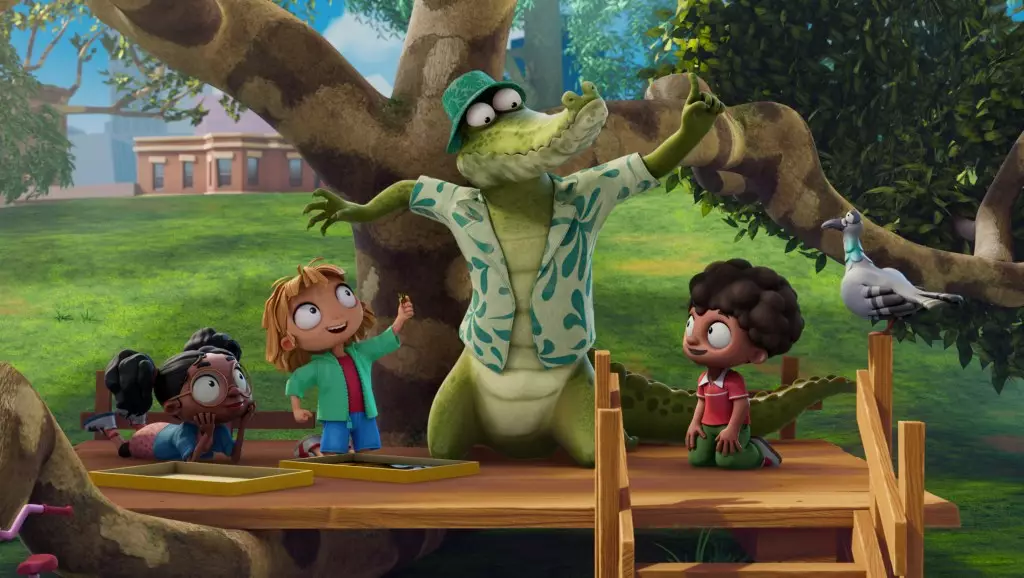In the realm of children’s animated programming, few things draw interest like the announcement of a new series that promises both whimsy and heart. Nickelodeon has recently revealed its acquisition of Mr. Crocodile, an adaptation of Joann Sfar’s beloved French book *Mister Crocodile is Very Hungry*. While it’s easy to dismiss yet another animated show targeting kids, the nuances behind Mr. Crocodile’s concept are deserving of scrutiny, revealing insights that are both charming and deeply reflective of contemporary childhood dynamics.
What sets Mr. Crocodile apart is not merely the premise of a talking reptile befriending an eight-year-old girl named Daisy, but the underlying themes that resonate with the complexities of modern youth interactions. Navigating the pressures of separate family homes, as Daisy does, becomes the backdrop for the series’ comedic adventures. This premise invites a discussion about the changing structure of the family—a subtle but powerful commentary woven into the fabric of the storyline.
Reality Meets Fantasy in Unique Ways
Chief among the show’s strengths is its handling of diverse backgrounds and experiences. Living in a mobile home community, Mr. Crocodile embodies the adaptability necessary for children to cope with the unpredictability of life. Rather than erasing the difficulties children face, the show promises to encapsulate the view of life through ‘crocodile logic’—a term that, in itself, becomes a metaphor for innocence and naiveté. This is crucial in offering viewers an avenue to explore their feelings in a safe, humorous setting, and potentially allowing them to develop resilience and empathy.
Moreover, Mr. Crocodile’s adventures are marked by misunderstandings, showcasing that even the best intentions can lead to chaos. It’s here that the series brims with delightful energy and humor while teaching children the value of friendship and the beauty found in differences. The essence of such misunderstandings, presented with a light-hearted spin, teaches kids to navigate the murky waters of social interaction—a skill that is more vital now than ever in an age marked by digital communication overshadowing personal contact.
Artistry and Adaptation: The Visual Feast
Visual storytelling has always played a monumental role in the world of animation, and Mr. Crocodile’s captivating CGI design confirms that visual aesthetics can elevate the narrative experience. Sfar’s Magical Society, the production company behind the series, has done a commendable job of transforming whimsical illustrations into three-dimensional characters that retain their charm and quirkiness. The creative process, described by one of the producers as “deeply moving,” reflects an earnest commitment to showcasing the magic inherent in childhood imagination.
Each episode, carrying forward the tradition of vibrant storytelling that both captivates and educates, offers a treasure trove of visual delight. While some view animation as a medium strictly tailored for children, Mr. Crocodile breeches that common misconception, inviting the entire family to indulge in its entertainment.
Molding Future Generations of Dreamers
The implications of Mr. Crocodile extend beyond individual episodes. As a product of international collaboration, with insights from both the French and American animation industries, it stands as a testament to the power of shared narratives. Nickelodeon, by committing to such projects, not only ensures that timeless stories are preserved, but they also help mold the imaginations of future generations yearning for adventurous friends like Mr. Crocodile.
As we consider the intersection of entertainment and educational values, it becomes crucial for animated shows to foster spaces where dialogue thrives. In a world rife with distractions, Mr. Crocodile promises a realm where laughter and life lessons intertwine, igniting curiosity in viewers both young and old alike.
In sum, as we await the premiere of Mr. Crocodile, we should embrace the avenues it opens for children, reinforcing that while friendships may be born from the most unlikely connections, the adventures and lessons they accord remain universally relatable. This series has the potential to be more than just a whimsical depiction of innocence; it might also launch a broader conversation on the essence of friendship, adaptability, and understanding in our ever-evolving social fabric.

